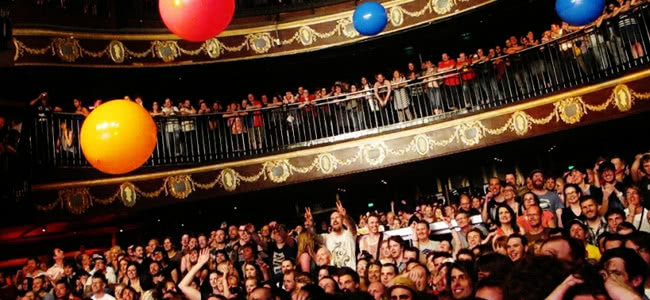A Melbourne City Council meeting was held last week that covered submissions by property developers to demolish the Palace Theatre in favour of constructing luxury apartments at the site of the 2,000 capacity live music venue, which could reach a final decision next week.
But as The Herald Sun reports, Lord Mayor Robert Doyle excused himself from the council meeting when the $180 million project was raised, citing an indirect conflict of interest because his former right-hand man is working as a lobbyist for the hotel and apartment development.
Alister Paterson, the Lord Mayor’s former chief-of-staff, is a consultant on the CBD hotel complex proposal from property developers Jinshan Investments for the 31 storey development, which would include Australia’s first W Hotel – a 205-room, 145 apartment complex built across 20,000 square metres – at the top end of Bourke Street.
The Herald Sun makes no mention of the strong opposition to the development by local community supporters of live music, including the burgeoning Save The Palace Theatre group, whose more than 29,500 Facebook members have been lobbying heavily against the destruction of the historic live music venue for the sake of a luxury hotel complex, urging supporters to make formal objections to the City Of Melbourne Planning register.
Final approval falls to Victorian Planning Minister Matthew Guy, who has held his line that Jinshan Investments were “dreaming” if they though their submissions would be approved in their current form. “It is too tall, it is in the wrong location,” said the Minister in early July. “It’s a good development but in the wrong location… I’m sure they’ll have no trouble finding another site either in Southbank, Docklands or throughout the CBD.”
“It’s a good development but in the wrong location,” said Minister Guy of the project last week. “For the Parliament Hill precinct, that building is too tall… I understand this is an international hotel brand, one of the most respected in the world (and) I’m sure they’ll have no trouble finding another site either in Southbank, Docklands or throughout the CBD.”
Minister Guy’s concerns about the project’s size are shared by fellow City Council Arts and Culture portfolio chairman Rohan Leppert who says the proposed development is in breach of heigh controls. “The height limit is the most obvious example of problems that the council or the minister will have when they are assessing the application against the planning scheme,” says the councillor.
Love Music?
Get your daily dose of metal, rock, indie, pop, and everything else in between.
The project however, has the support of Victorian Tourism Industry, with Council Chief Executive Dianne Smith pointing out the “economic and social benefits” of building Melbourne’s first W Hotel complex, which would provide “hundreds of jobs and tens of thousands of dollars per day for local retail and hospitality.”
An alarming rendering of the hotel development, showing what the top end of Bourke Street would look like without the Palace Theatre should the developers’ luxury submissions are approved, turned up online earlier this month courtesy of Melbourne Heritage Action (MHA). “We’ve discovered that the development would also see part of the 3 storey terrace shops next door demolished, ruining their symmetry, all so a laneway can we widened for use as a taxi drop off point,” wrote MHA in their post.
The Palace’s facade is protected as a Melbourne Heritage but its interior remains vulnerable., while MHA emphasises that objections made to the City of Melbourne should focus on heritage controls, “even if only D grade and interior (are) not officially listed.”
The MHA and the ‘Save The Palace’ group are also pushing for another 5,000 or so signatures for their online petition, bringing it to their goal of 30,000 ahead of a rally to take place at a to be determined location on August 31st in Melbourne.
Following a review of heritage listings in the Bourke Hill precinct of the Melbourne CBD, a final decision over the Palace project could go to council as early as next week.
As Music Victoria CEO Patrick Donovan emphasises, it is “one of the few medium sized venues that can host the bigger Australian acts as well as international touring bands. Its absence would leave a huge gap for 2,000 capacity standing room venues,” leaving only the likes of the 1,050 capacity Billboard, the 1,500 capacity Forum Theatre, and the 2,896 seats of St Kilda’s The Palais for promoters left to choose from, either downsizing or upsizing their capacities, while competing with other cultural events like the comedy and film festival.

































